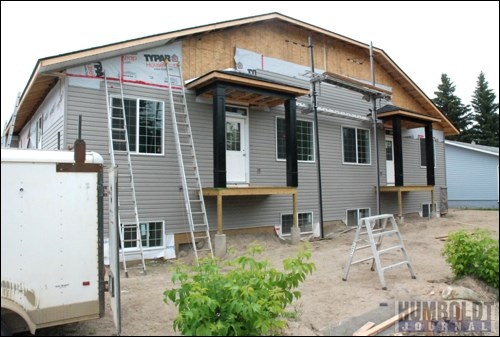Canadian Real Estate prices are scheduled to drop in 2012, foretells an economic report released by TD Economics June 14.
The report predicts that on a national scale, resale activity will fall by 15.2 per cent over the next two years, and that average prices will fall by 10.2 per cent over the same period.
This kind of article has been appearing in the press ever since the economical crisis hit the U.S. in 2008, and interest rates dropped in Canada considerably. Now it seems the threat is looming over us again.
But what about Humboldt - what is going on in the real estate and rental market in our city? Are home owners able to sell their homes and make a profit? Are there enough rental properties to cater to the demand, and are they affordable? Just how is the city growing today?
"We're really in our own bubble here," said Dan Torwalt, realtor at Century 21 Diamond in Humboldt. "We've got our own economy happening here largely due to BHP Billiton, and that's causing a lot of activity."
Torwalt is referring to the proposed potash mine BHP Billiton is hoping to build near Jansen.
From a realtor's point of view, Torwalt says there's been dynamism in the real estate market over the last year, and he can't see prices dropping here.
"People have been coming here from other provinces, buying houses, and a lot of it is because of the Jansen project," said the Humboldt realtor. "I can't see prices dropping, because the projections are the population is going to grow big time here over the next five years. The mine is going to affect the whole trading area, all your small towns are going to benefit big time, as well."
For someone who is looking to buy a home in the city, there may appear to be a wide selection, judging from the number of listings in the realtors' windows, but Humboldt realtor Shirley Seidel of Centra Realty Group doesn't agree.
"When people are looking to buy a home, they're looking in a specific price range," said Seidel, "and when you narrow it down to accommodate that, they don't have a big choice."
Seidel, who has been in the real estate business for over 20 years, admits that the market may be a little bit soft compared to the figures in 2007. For that reason, people who are trying to sell some of the smaller homes in the centre of Humboldt are not necessarily coming out ahead.
"We did have to make that correction and adjustment," Seidel acknowledged. "There's the odd home among the lower-priced houses where they won't be able to get their money back."
Now, says Seidel, five years later, the current market has pretty well caught up with that adjustment, and we're going to see a big increase.
The city will continue to grow, according to both realtors, but the expansion will continue north and northwest of Humboldt. The city will get out of development and let private developers in, predicts Torwalt. Homes in these areas tend to be well in excess of $300,000.
As for the smaller homes in the core of the city, there is still a market for properties in the $125,000-$200,000 price range, either as rental accommodation or as a starter home for a single person or a young couple. The tendency now seems to be that properties with houses considered to be "tear-downs" will be bought up by developers and new, multi-dwelling accommodation will be built in its place.
Ideally, construction such as this will boost the number of rentals available to newcomers and help to offset the rental shortage that the city has been experiencing for some time. There is a down side, however: the high costs of construction today result in increasing rents, and will people who move to Humboldt be able to pay those prices?
Seidel feels that this will be the natural progression of things, with the way the city is growing.
"If we can encourage investors to come to Humboldt and build," the realtor said, "if we can increase our rent prices, we will attract investors. Eventually that will happen, people will have to pay more for rent."
It's hard to see this as a good thing when you are the renter, but for the growth of a city, such increases are considered positive. It means a stronger economy because a growing population needs an increased number of amenities and the workforce to make it all happen.
The benefits come in many different areas: the need for longer library hours, or more funding for the sports programs in town, or more teachers for a growing number of children, or more employees for an increase in retail providers.
These are all things that a growing city needs, and that can improve the quality of people's lives, no matter what their interests.




